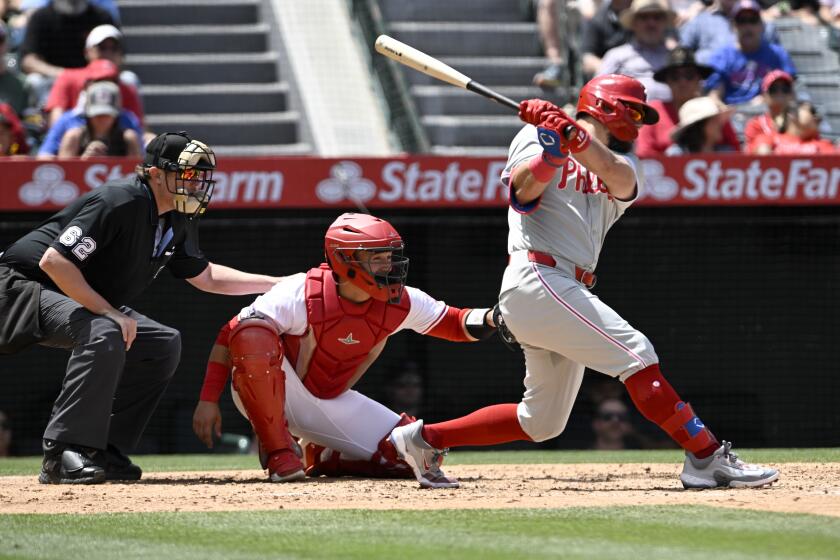Sam Mellinger: With big bucks at stake, daily fantasy leagues blur distinction between games, gambling
If you’ll pardon the mangled cliche here, it turns out that a sports revolution is being televised during commercial breaks.
The same factors that are shaping change in every other part of our lives technology, sure, but also money and power are shifting the ground beneath the metaphorical feet of sports fans and leagues.
This has been obvious in many ways for many years, but so far mostly in the form of how fans can access and analyze their favorite teams and sports.
Now, it is taking gambling or at least what appears to be gambling, and more on the distinction in a minute into the open. State and federal laws are being rewritten and reexamined. Billions of dollars and the attention of millions of sports fans hang in the balance.
The shift is obvious in the ads for daily fantasy sports leagues promising seven-figure prizes that run on a virtual loop during any commercial break of a game on TV. The ads are on many sports websites, too, including NFL.com which is particularly telling because that league spent enormous amounts of money lobbying against a bill that would’ve legalized online non-sports gambling.
The NFL hasn’t gone as far as other leagues. Major League Baseball, the NBA and the NHL have reportedly reached official agreements with daily fantasy sports leagues, even as the legality of those operations is being challenged in court and examined by Congress.
Boundaries are being challenged. A new industry is exploding. Long-held beliefs are changing. This today, right now is a major turning point in the complicated history of gambling in our country, and the way the situation shakes out will forever impact the way sports are consumed.
“Yes, absolutely,” says I. Nelson Rose, an expert on gambling law and a professor at Whittier Law School in California. “Even the NFL coming out in favor of something that looks like gambling is astounding.”
We are still in the frontier stages of this, but the rules are clearly changing. League-sanctioned websites again, NFL.com stands out are producing content and giving tips for fans playing in daily fantasy leagues, which are being promoted and advertised in ways that sure look like gambling.
Nevada recently legalized what are essentially mutual funds for sports bets. A man named Matt Stuart started the first one, which he likens to an investment club. Now, he thinks he can get a 7 to 10 percent return on that investment. The investors can come from anywhere in the country, so this is one more small step toward people outside Nevada being able to legally wager money on games.
Daily fantasy leagues are less subtle, even as their legality is in question. The argument depends on a small distinction, and the outcome will decide what could be a billion-dollar industry. Legally, gambling is defined in part as games of chance played for money, like slot machines.
Daily fantasy leagues are defining themselves as games of skill. This is a distinction that reasonable people can disagree on. For instance, DraftKings is advertising NFL lineups that won $2 million in the first two weeks of the season.
The first lineup included Jarvis Landry (who returned a punt for a touchdown) and Tyler Eifert (who doubled his career touchdown total in one day). The second included Danny Woodhead (who went over 100 yards from scrimmage for the first time since 2010) and Travis Benjamin (who scored three touchdowns after scoring just five in his first 39 games).
Is that skill, or luck?
And if it’s skill, which isn’t banned by the gambling law, why is that different than picking, say, the Chiefs and the points on Monday night?
“If you’re already telling people they can gamble on the lottery and in other ways, then why not allow this?” says David Schwartz, director of the center for gaming research at UNLV. “It’s something people obviously want to do.”
Rose, Schwartz and other gambling experts see clear momentum toward looser laws. Opposition is either hard to find or disorganized.
Sports gambling is legal and regulated in many other countries, perhaps most notably England. A recent white paper by the research branch of GamblingCompliance.com said a fully legal sports market in America would produce $200 billion in wagers and $12.4 billion in revenue. That’s more money than any professional sports league, including the NFL.
Right now, it’s believed that less than 5 percent of sports bets are made legally.
Along with following what seems like an evolving public opinion toward gambling it’s a vice, but largely a harmless one the most compelling reason for the shifting treatment of sports wagering is the money available.
That’s why we’ve come this far, you know. The NFL and other sports leagues have traditionally been vehemently opposed to gambling. They often characterized themselves as protecting the integrity of their games, despite a long history that shows regulated gambling is the strongest deterrent to scandals.
If you enjoy seeing hypocrisy exposed, you are enjoying the way this is playing out.
The NFL once spent considerable money, effort and time lobbying against a bill that would not have affected sports wagering. The league did this because it worried about a slippery slope, that if it didn’t take a stand against all gambling it could not take a stand against any gambling.
But money rules the world, particularly the sports world, and extra-particularly the NFL’s world. The advertising revenue from daily fantasy leagues is nice, but the real attraction is in television ratings.
The NFL has long operated with TV ratings and contracts in mind. That is where the league gets the bulk of its revenue, which means the NFL has been forced to quietly change its stance on gambling with the emergence of daily fantasy leagues.
Even more than seasonlong leagues, daily games mean a heightened investment in performances, some of which happen in otherwise dull or uneven games. Those fans are more likely to continue watching blowouts, or further plan their weekends around the television.
The NFL, especially, has been predictably brilliant about how it’s embraced this new revenue stream. While other leagues have latched on to a particular brand of daily fantasy games, the NFL has let them fight amongst each other. They are all advertisers, and they all have customer bases which are being programmed to watch games more closely. This way, the NFL also gets to stay out of the legal battle.
We have become used to the effect of seasonlong fantasy football on the viewing experience. A lot of us have our favorite team, but we balance that rooting interest with fantasy players on other teams.
Daily games take it to the extreme, with individual rooting interests changing by week one more step away from the traditional sports experience.
It’s all good for the leagues as long as people are watching, and there is every reason to believe the trend of daily fantasy games is drawing more people to watch more games for longer periods.
This is the latest revolution in the way sports are consumed, and there are too many moving parts for anyone to know exactly how or when this will end. But the warm welcome by professional leagues the NFL in particular means it’s much more likely to grow than fade.
This may be a new trend, but it’s following the same thing as most every other trend since the beginning of time money.
(c)2015 The Kansas City Star (Kansas City, Mo.)
Visit The Kansas City Star (Kansas City, Mo.) at www.kansascity.com
Distributed by Tribune Content Agency, LLC.
More to Read
Get our high school sports newsletter
Prep Rally is devoted to the SoCal high school sports experience, bringing you scores, stories and a behind-the-scenes look at what makes prep sports so popular.
You may occasionally receive promotional content from the Los Angeles Times.






